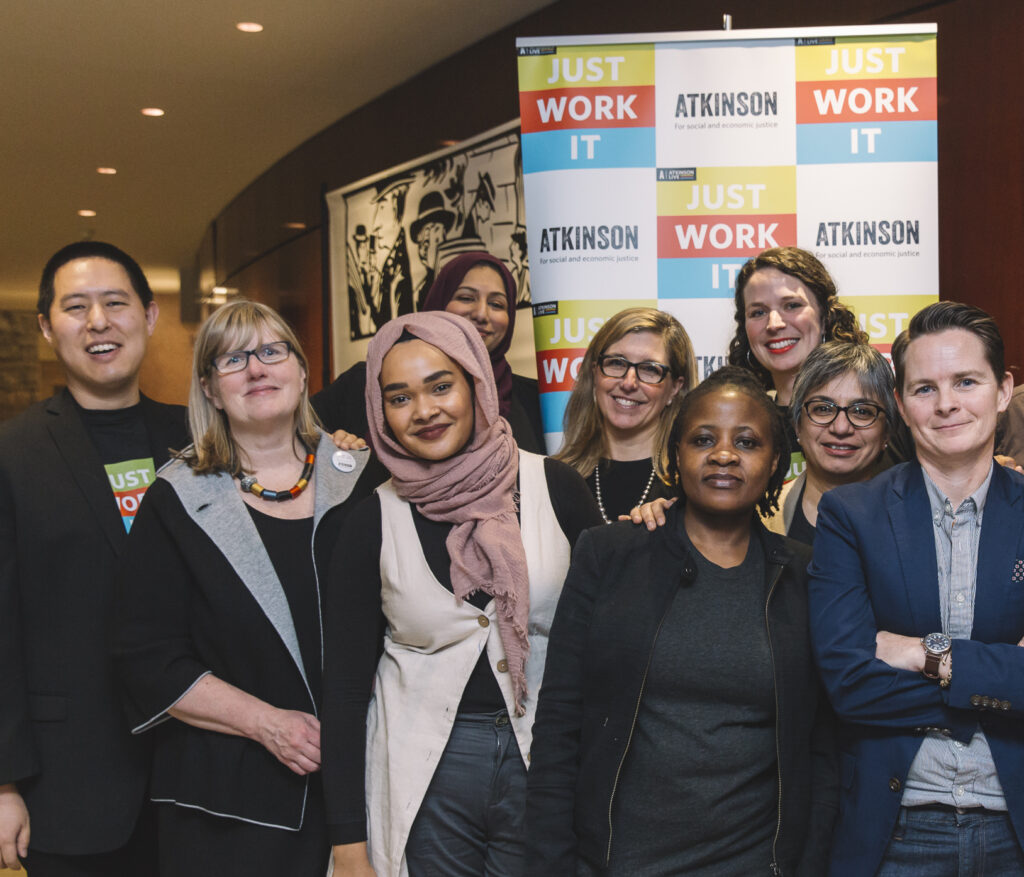
Nora Cole is Atkinson’s Manager of Policy and Communications.
After five years at Atkinson, I’m leaving to become Councillor Ausma Malik’s Chief of Staff at Toronto City Hall. Ausma and her entire team share a belief that the city can be more equitable and livable – one of many things we hold in common with voters in Spadina-Fort York.
In making the move from social justice philanthropy to municipal politics, I’m not leaving the movement for decent work and a fair economy. I’m simply returning to an arena where I can play a different role and have a more direct impact on the democratic inequality that produces precarious work and limits economic opportunities for too many people.
This is not the first time I’ve felt pulled into electoral politics and a deeper engagement with our democratic institutions. I came to Atkinson fresh from a graduate program in governance, development and public policy in the UK, and a background in political organizing and constituency services at the Toronto District School Board, City Hall, Queen’s Park and the House of Commons.
I jumped at the chance to work with Colette Murphy, Pat Thompson, Jenn Miller and the rest of the team to learn more about community-labour organizing for more democratic workplaces, corporations, and economies – and to think about the intersection with civic elections. In three successive roles since 2018, I also welcomed opportunities to contribute to Atkinson’s advocacy efforts to shift more democratic power toward those who have been historically and persistently excluded from decision-making.
Now as Manager of Policy and Communications, I take great pride in having:
- Participated on the core team that organized a unique “people’s celebration” of the International Labour Organization’s 100th anniversary called My Labour Our Future;
- Contributed to cross-country coalition conversations and a policy brief on the principles of a new employment insurance system;
- Built original digital content for multiple platforms to support partners’ social media campaigns and Atkinson’s programs and initiatives (such as our collection of playlists and occasional posts on topics related to decent work and workers); and,
- Produced publications, website content, and social promotions to extend the reach of journalists who have received the prestigious Atkinson Fellowship in Public Policy.
Communicating daily about the “good fight” for a higher minimum wage, paid sick days, community benefits tied to infrastructure development, and more has reminded me just how much elected representatives, public officials, movement leaders, and journalists depend on each other. It’s the friction created by their different roles and accountabilities within a democracy that results in real progress with and for people.
Experimenting with podcasting for narrative change and democratic engagement has helped me develop other movement building skills. Until our in-house production team began working on Just Work It, Atkinson’s podcast about decent work for and by millennials, I could never have imagined that show notes could be a tool for public education and civic literacy! We covered a wide range of issues with a diverse group of conversation partners over the course of three series, sixteen episodes and one live event. But all the pieces of the project pointed to one undeniable fact: when we democratize a system or space, the social and economic benefits multiply.
When Ausma told us she was leaving Atkinson to run for city council, she said “the pull to electoral politics is working on these issues day and night. It’s the home stretch on the issues we work on, the last piece is with elected officials who are supposed to work for your interests.” It’s this “home stretch work” that I’m ready to do now with our talented team at City Hall, the Atkinson community, and everyone who shares a commitment to building a city where all of us belong and thrive.
I’m leaving Atkinson with so much gratitude for the relationships, experiences and stories that have been memorialized in countless tweets, playlists, field notes, reports, publications, website copy and briefing notes – and some ideas and projects that never made it off the jamboard!
Back in 2021, I started one on the privilege of standing for public office – who has it, who doesn’t, and why – and what could be done to lower barriers and increase participation among groups that are underrepresented on ballots for seats at decision-making tables. How can we ensure that decent work and a fair economy include opportunities for democratic engagement?
I hope you’ll consider these questions within the context of your own life, organization and sector, and help move this important conversation from the jamboard into the world.
